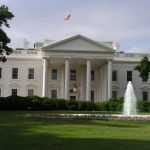U.S. v. Nixon: The Supreme Court Rises Above the Political Fray

Following the conclusion of the 2011-2012 term, much has been said about the Supreme Court’s ability to stay above the political fray. A number of controversial issues, including the Affordable Care Act and Arizona’s immigration law, were hotly debated by Congress, the media, and the public. However, the justices seemed to focus solely on their job of interpreting the law.
This, of course, isn’t the first time the U.S. Supreme Court has been asked to delve into highly politicized issues. In the landmark case U.S. v. Nixon, the Court was asked to take on the alleged misdeeds of a sitting president.
The Facts of the Case
In the wake of the Watergate scandal and following the indictment of several of President Nixon’s staff members, the Special Prosecutor filed a motion under Fed. Rule Crim. Proc. 17(c) for a subpoena duces tecum for the production of certain tapes and documents. These tapes included conversations and meetings between the President and others.
The President, claiming executive privilege, filed a motion to quash the subpoena. He argued that the dispute between him and the Special Prosecutor was nonjusticiable as an “intra-executive” conflict, and that the judiciary lacked authority to review the President’s assertion of executive privilege. The dispute quickly came before the Supreme Court.
The Supreme Court’s Ruling
The Supreme Court first ruled that the dispute between the Special Prosecutor and the President presented a justiciable controversy, noting that the mere assertion of an “intra-branch dispute,” without more, does not defeat federal jurisdiction.
As the Court further explained, “The action of the Special Prosecutor within the scope of his express authority seeking specified evidence preliminarily determined to be relevant and admissible in the pending criminal case, and the President’s assertion of privilege in opposition thereto, present issues ‘of a type which are traditionally justiciable’” under existing precedent.
The Supreme Court next turned to the claim of executive privilege. It concluded that while presidents do enjoy a constitutionally protected executive privilege, the privilege is not absolute.
Citing Marbury v. Madison, the majority reasoned, “Neither the doctrine of separation of powers, nor the need for confidentiality of high level communications, without more, can sustain an absolute, unqualified presidential privilege of immunity from judicial process under all circumstances. The President’s need for complete candor and objectivity from advisers calls for great deference from the courts. However, when the privilege depends solely on the broad, undifferentiated claim of public interest in the confidentiality of such conversations, a confrontation with other values arises.”
The Court ordered Nixon to turn over the tapes, noting “Absent a claim of need to protect military, diplomatic, or sensitive national security secrets, the confidentiality of Presidential communications is not significantly diminished by producing material for a criminal trial under the protected conditions of in camera inspection, and any absolute executive privilege under Art. II of the Constitution would plainly conflict with the function of the courts under the Constitution.”
Previous Articles
SCOTUS Decision in Bowe v. United States Is First of the 2026 Term
by DONALD SCARINCI on February 5, 2026
In Bowe v. United States, 607 U.S. ___ (2026), the U.S. Supreme Court held that Title 28 U.S.C. § ...
SCOTUS Rules State Can’t Immunize Parties from Federal Civil Liability
by DONALD SCARINCI on January 29, 2026
In John Doe v. Dynamic Physical Therapy, LLC, 607 U.S. ____ (2025) the U.S. Supreme Court held that...
Supreme Court to Address Racial Discrimination in Jury Selection
by DONALD SCARINCI onWhile the U.S. Supreme Court has concluded oral arguments for the year, it continues to add cases t...
The Amendments
-
Amendment1
- Establishment ClauseFree Exercise Clause
- Freedom of Speech
- Freedoms of Press
- Freedom of Assembly, and Petitition
-
Amendment2
- The Right to Bear Arms
-
Amendment4
- Unreasonable Searches and Seizures
-
Amendment5
- Due Process
- Eminent Domain
- Rights of Criminal Defendants
Preamble to the Bill of Rights
Congress of the United States begun and held at the City of New-York, on Wednesday the fourth of March, one thousand seven hundred and eighty nine.
THE Conventions of a number of the States, having at the time of their adopting the Constitution, expressed a desire, in order to prevent misconstruction or abuse of its powers, that further declaratory and restrictive clauses should be added: And as extending the ground of public confidence in the Government, will best ensure the beneficent ends of its institution.





